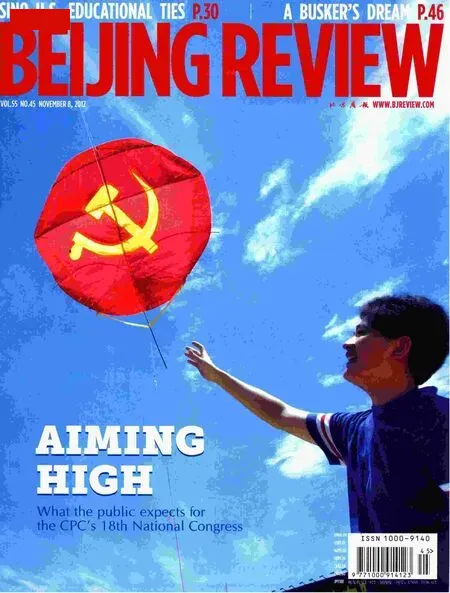THE HOPES OF THE PEOPLE
By Wang Hairong
THE HOPES OF THE PEOPLE
By Wang Hairong
China’s plans for further development weigh heavily on the m inds of the public in the run-up to the Party’s national congress

CELEBRATION:Farm ersin Neihuang County,central China's Henan Province, arrange redpeppers and corn into the flag o f the Comm unist Party o f China before the opening o f the 18th National Congress o f the Party
T he 18th National Congress of the Communist Party of China (CPC)begins on November 8 in Beijing.
The national congress is the highest leading body of the Party and is held every five years.
The congress w ill make strategic plans for China’s reform and development w ith a focus on outstanding problems that have emerged during the country’s development and issues that concern the people’s interests, according to a statement issued on September 28 after a meeting of the Political Bureau of the CPC Central Committee.
“The 18th CPC National Congress is a very important conference to be held at a critical time when China is building a moderately prosperous society in an all-round way, deepening reform and opening up and accelerating the transformation of its econom ic development,” the statement said.
It emphasized that the upcoming national congress w ill thoroughly exam ine current international and domestic issues and take into account new requirements for the country’s development.
This year’s congress w ill also elect the Party’s new leadership, including the central committee, the general secretary and the political bureau of the central committee and its standing comm ittee.
The CPC Constitution w ill be amended at the congress to reflect changes proposed by the CPC Central Committee since the Party’s 17th National Congress in 2007.
Since the 16th CPC National Congress in 2002, the CPC Central Comm ittee has im p lemented the Scientific Outlook on Development, which puts people first and calls for comprehensive, balanced and sustainable development instead of blind pursuit of gross domestic product (GDP) grow th.
The upcoming congress w ill review the country’s development in the previous decade create policies to guarantee future development, said Xin M ing, a professor at the Party School of the CPC Central Comm ittee.
Xin said that the next five years w ill be a key period for realizing the country’s goal of building a moderately prosperous society and the public w ill be watching closely.
Economic development
Econom ic development is at the heart of the CPC. “In leading the cause of socialism,the CPC must persist in taking econom ic development as the central task, making all other work subordinate,” according to its Constitution.
In 1982, at the 12th CPC National Congress, the Party embarked on a path of socialism w ith Chinese characteristics.
A three-step development strategy for the country’s modernization was put forward in 1987 at the 13th CPC National Congress.
In step one, in the 10 years from 1981 to 1990, the country aimed to double its percapita GDP.
In step two, per-capita GDP would double again from 1991 to 2000 in order for China to become a fairly well-off society.
In step three, by the m iddle of the 21st century, China w ill have basically realized modernization. Its level of development is expected to be on par w ith moderately developed countries.
The fi rst two targets have been achieved.Now, the country is working toward the goal of building a moderately prosperous society by 2020.
Gao Chengyi, Deputy General Manager of the Xiamen subsidiary of China United Tally Co. Ltd. ` southeast China’s Fujian Province, said that he expected the country to continue its strategy of social and economic development.
In an article published on Qstheory.cn, a website run byQiushi, a publication for the CPC Central Comm ittee, Gao said that he hopes the 18th CPC National Congress w ill further clarify the goals for the third step of development.
Lai Weimin, a Beijing-based researcher in economics and corporate strategy, said that he expects the Party congress w ill make policies to accelerate China’s transformation from an export- and investment-driven grow th model to a consumption-driven one. He also expects a policy announcement on plans for China to shift to service industries and high-end manufacturing.
“Successful transformations in these fields will help the country to mitigate international risks and solve deep-seated problems and confl icts that have arisen,” he said.
In addition, Lai said that the country should boost the econom y by creating a healthy business environment, further regulating the real estate industry, giving incentives to enterprises in strategic emerging industries,opening some investment areas to private capital, and creating a liberal social environment for entrepreneurs.
The 18 th CPC Na tiona l Cong ress is a ve ry im po rtan t con fe rence to be he ld at a c ritica l tim e w hen Ch ina is bu ild ing a m ode rate ly p rosperous so cie ty in an a ll-round w ay, deepen ing re fo rm and op en ing up and acce le ra ting the transfo rm a tion o f econom ic deve lopm en t
Social programs
The Party not only aspires to build China into a prosperous, strong and modern socialist country, but also into a democratic, culturally advanced and harmonious one, as indicated by the CPC Constitution.
During a recent interview with the Party’s Internet portal CPC.people.com.cn, Chen Baosheng, Vice President of the Party School of the CPC Central Comm ittee, said that in the past three decades, the Party has made great achievements in carrying out political reforms.
He added, however, that the political restructuring is still confronted w ith many problems that must be addressed.
“These challenges cannot be evaded. You must forge ahead. So I hope the 18th CPC National Congress w ill make new arrangements in these aspects,” Chen said.
Wu Yingzi, Deputy Dean of the Law School of Nanjing University in east China’s Jiangsu Province, suggested that the authorities strengthen its role in social management and public service, and expand the public’s participation in political affairs. He said that such efforts w ill help to defuse social confl icts that have surfaced during economic and social transitions.
Zhou Youyong, Dean of the Law School of Southeast University in Nanjing, Jiangsu,said that the role of law in social governance should be given full play. He expects the Party will improve the way it communicates,including more information disclosure and public participation in decision making.
Gao suggested that at the 18th CPC National Congress, the Party objectively evaluate the seriousness of salient social problems such as income disparity and corruption, and show its determ ination by outlining effective countermeasures.
Party building
As a delegate to the 18th CPC National Congress, Chen Baosheng said that he hopes the congress w ill further promote intra-Party democracy, highlight the role of Party members, and reform the Party’s leadership system.
Gao called on the Party to objectively and fairly review its achievements in various periods of history, especially the decade after the 16th CPC National Congress. He also said that the 18th CPC National Congress should make new arrangements to tighten discipline among its members.

